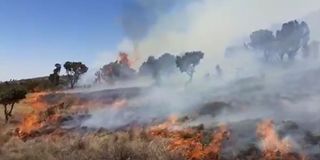VIDEO: One day after, Mt Kilimanjaro is still burning

What you need to know:
- The fire has since destroyed several acres of moorlands and as of Monday evening 2100Hrs local time there were no signs of over 400 firefighters , a number that later increased to 600 containing the fire.
Moshi. It has been close to 30 hours since the wild fires broke on Mount Kilimanjaro, and the hungry flames are still raging even as fire brigade and volunteers give their all to contain the hungry flame which is at some 2700 metres above sea level.
The fire has since destroyed several acres of moorlands and as of Monday evening 2100Hrs local time there were 400 firefighters , a number that later increased to 600 tocontain the fire.
Images taken from Himo showed the flames raging on one of Tanzania’s prime tourist destinations despite authorities committing that it would not affect tourism.
Speaking to The Citizen, Tanapa’s communication official Pascal Shelutete confirmed that despite the day long efforts, the team has not been able to put out the raging flames which could be seen as far as 30km from Moshi town.
“ As I speak the fire is still on but we are working around the clock but we haven’t been able to put it out, despite the increase in the number of personnel,” said Shelutete.
Earlier on in the day Kinapa’s Angella Nyaki told media that a team of fire fighters which included volunteers, police, scouts, and students had reached the scene.
“The problem is that the fire was huge causing a large area to be burnt due to the strong winds but we are doing our best to limit its spread,” said Ms Nyaki
There were signs of a return to normalcy after the outbreak of the Covid-19 pandemic, prior to that, Mt Kilimanjaro received an average of 50,000 climbers per year.
Though the cause of the fire is yet to be established but sources that have worked close to Kinapa say the constant cause of fires on the mountain has been smoking and poaching activities.
This is not the first time that the same area has been burnt, in October 2016 another fire erupted around Shira at an altitude of between 3500 and 4000 meters burning over 3200 acres of mountain vegetation.
In January 2012, there was another outbreak that was attributed to people who had entered the park to harvest honey.




